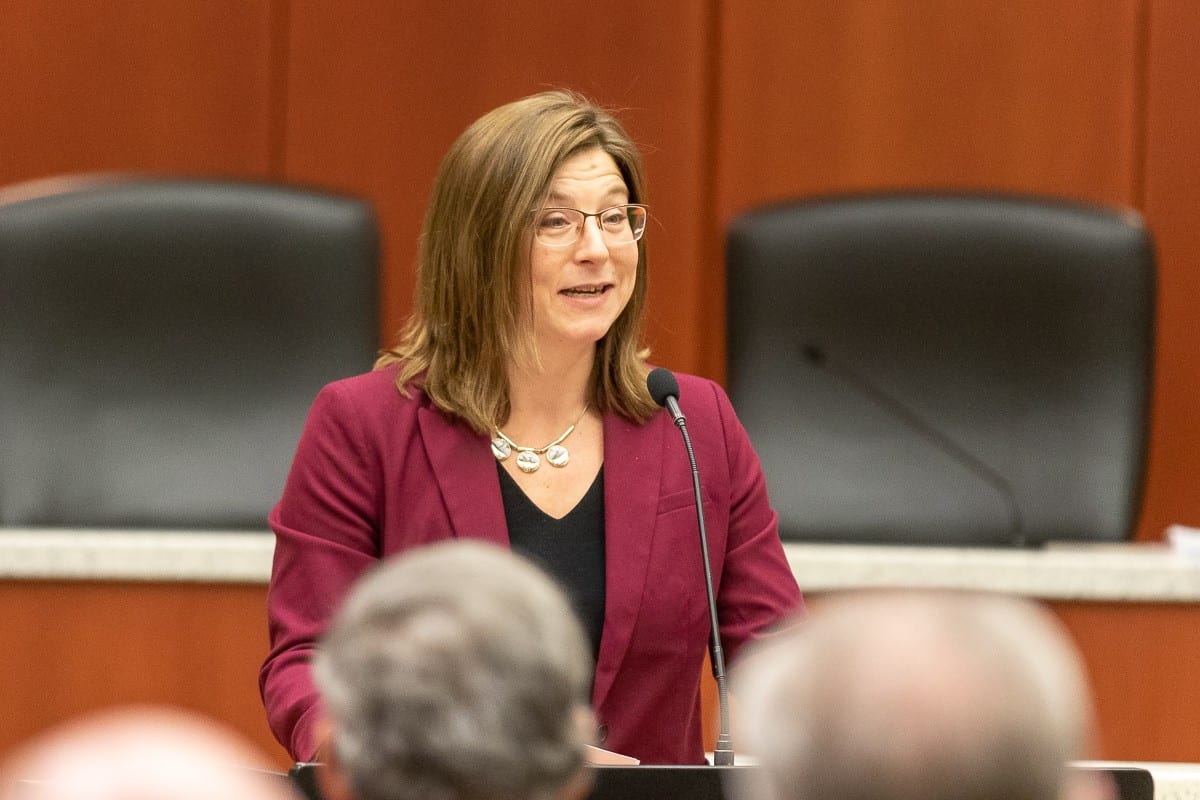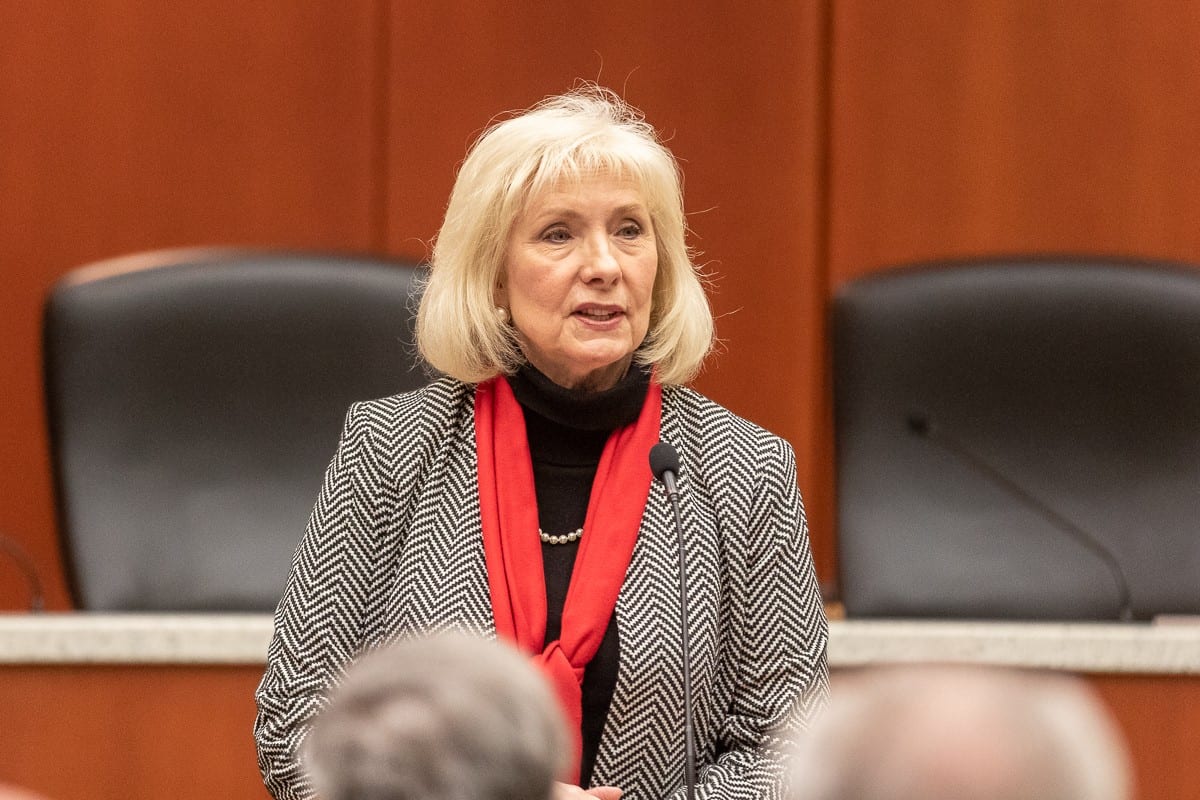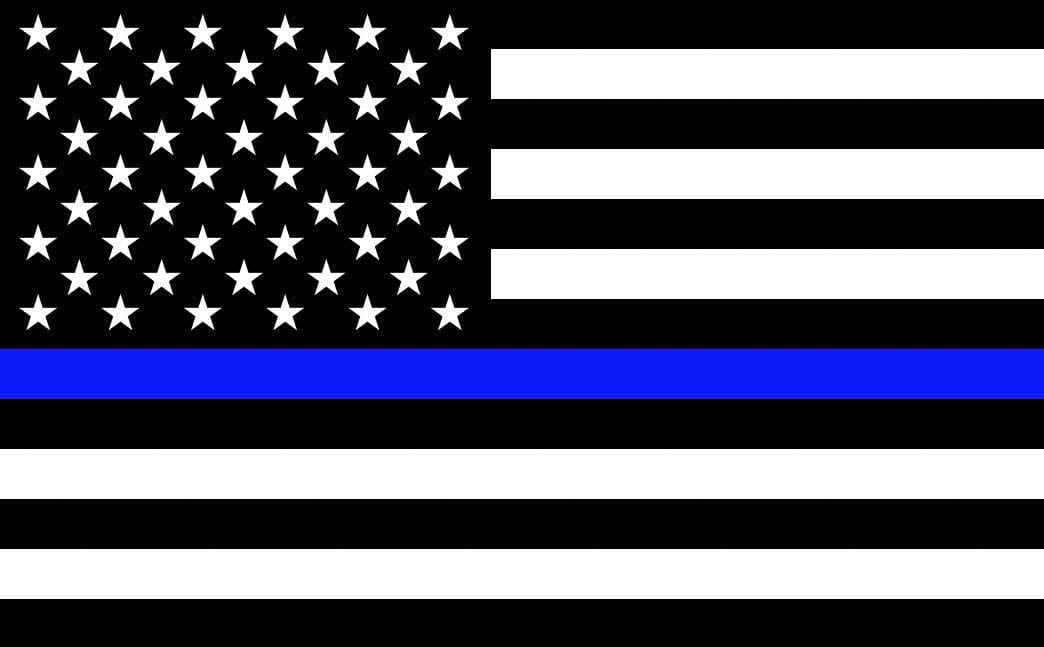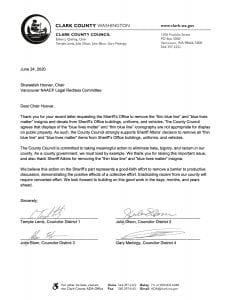During a spirited discussion between councilors, County Chair explains her reasons for not signing the letter supporting the decision of Sheriff Chuck Atkins
The Clark County Council has penned a letter supporting Sheriff Chuck Atkins’ decision to remove Thin Blue Line decals from Clark County Sheriff’s Office vehicles, uniforms and office spaces. But, the decision was not unanimous and came with some spirited discussion.
Atkins announced his decision to all employees of his agency late last week and then announced it publicly Saturday during a webinar with the Vancouver NAACP honoring Juneteenth. On Wednesday, Clark County Councilor Temple Lentz presented a letter in support of Atkins’ decision and asked her fellow councilors to join her in signing the letter.

“Because the letter was sent to all of us and because fleet-owned vehicles are owned by the county, not by the Sheriff’s Office, it does make sense I believe for the County Council to have a response,’’ Lentz said of the need for the letter.
A copy of the letter can be found to the right, (click to enlarge):
The symbol is most often seen as the American flag with a single blue stripe down the middle. Atkins and many CCSO deputies had previously used it to signify solidarity with law enforcement officers killed in the line of duty. However, from the NAACP and Black Lives Matter perspective, the symbol was seen as synonymous with the Blue Lives Matter movement and disconnected to the plight of people oppressed by racism. Atkins said his decision was born out of several complaints that he had received.
The councilors’ discussion began with an exchange between Lentz and County Chair Eileen Quiring over what the Thin Blue Line decal symbolized.
“I think that it has come to mean to a large and undervalued section of our community, distrust of law enforcement,’’ Councilor Lentz said. “I think that regardless of what anyone claims, the original meaning has been distorted and it means different things. For publicly owned property to bear an insignia that has nothing to do with the public agency that owns it, especially when that insignia is divisive, and means different things to different people, is inappropriate.’’
After more discussion on the symbolism, Quiring summed up her opinion of the letter and the sheriff’s decision to remove the decals.

“This is very disturbing to me,’’ Quiring said. “I do not agree with what the sheriff has done. I completely disagree with it. I believe I honor people who have given their lives in the line of duty to enforce laws that we as leaders make. They have to go out there and enforce these laws, I believe when people are discriminated against, and I feel empathy for those people too, but that does not mean we have to set aside the people who defend the laws that we write, that we place. I do not agree with this letter. I will not sign it because I do not agree that we have systemic racism in our county, period.’’
Lentz quickly replied to Quiring’s statement.
“I appreciate you going on the record with that and I look forward to sending a letter with the signatures of those who do support moving our community forward,’’ Lentz said. “I want to say that talking about supporting people who want to eradicate systemic injustice, does not mean setting aside law enforcement, does not mean undervaluing others. This is not like there is a certain amount of justice to go around, or there certainly shouldn’t be.
“I’m very grateful to our law enforcement officers who do excellent work,’’ Lentz said. “That said, there are a number of people in our community who deal with injustice every single day. And when they come to us, and tell us that a detail that shouldn’t even be on the police vehicles because it is not a county insignia, when they come and tell us that that makes them concerned about whether or not they can trust law enforcement in our community. That is something worth listening to.’’

Medvigy said his decision to sign the letter was a result of his decision to support the sheriff’s actions.
“This was the sheriff’s decision,’’ said Councilor Gary Medvigy. “And it was a hard decision and he took full responsibility. I thought his insight into the issue was heartfelt. And he really worked hard on that response. It was his letter, his decision, he took ownership of it. And for that, I think greatly of him for doing that.
Medvigy, a retired judge, stated multiple times that he supports law enforcement, but he also supports reforms of police activities.
“That is a different issue from whether or not there could be better reforms, whether we could have dash cams, body cams, whether there could be different arrest protocols and standard operating procedures, techniques and tactics used by the police are always subject to review and reform,’’ Medvigy said. “Those are all separate issues and I’m glad to enter into them if we can do so in the Law Justice Committee.
Medvigy said he wanted to limit the symbolism used on public property.
“Going to the point of public property, the American flag is our flag,’’ Medvigy said. “The state flag is our flag, you know, to serve and protect. Those are all emblems that should be on public property. Anything outside of that really shouldn’t be supported by public dollars in any way. So, as far as symbolism, I think it is just to say we should have very few things on public property. As far as symbols, the American flag, the state flag, as far as flags, that’s as far as it should go.’’
Quiring insisted the councilors’ letter, ultimately, did make a statement about law enforcement.
“I just want to make a comment here about this letter and how it doesn’t make a statement about our law enforcement. I think it does,’’ Quiring said. “It’s saying that we’re taking meaningful action to eliminate bigotry and racism in our county. That is saying that by honoring these public employees, by the way which our law enforcement are, that we are eliminating this (symbol) that honors those who have lost their lives while enforcing the law, are basically hateful, full of bigotry and racism in our county. So I’m sorry, I do not agree that somehow we’re supporting our police by doing this, our sheriff’s officers or deputies, I do not believe that.’’
Councilor Julie Olson was not present for Wednesday’s virtual council time. However, she did join Lentz, Medvigy and Councilor John Blom in signing the letter, which was then sent to Shareefah Hoover, chair of the Vancouver NAACP Legal Redress Committee.
“I agree that we need to support law enforcement,’’ Blom said. “How do you find anyone who says they don’t support law enforcement? But, we don’t support law enforcement by talking about a sticker. We support law enforcement, by passing budgets that provide them the resources and tools that they need. We support law enforcement by having policy conversations with the sheriff and with the guild’s and with the community … that’s how we support our law enforcement, our deputies who I know put their lives on the line on a daily basis and they deserve our support for that.’’





